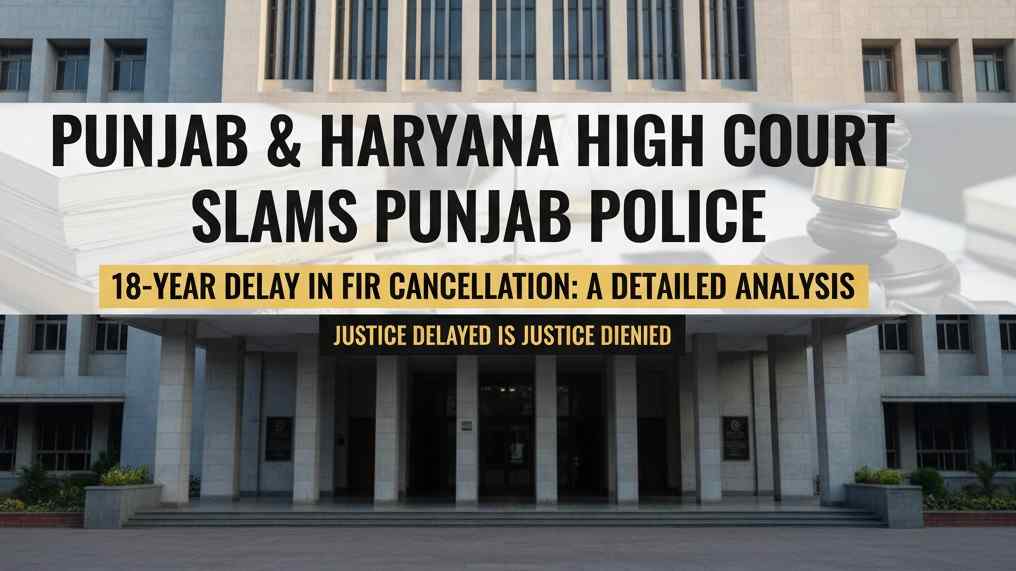The Punjab & Haryana High Court recently delivered a sharp rebuke to the Punjab Police for an unprecedented 18-year delay in filing an FIR (First Information Report) cancellation report. The case, which dates back to 2007, highlights deep-rooted inefficiencies within the criminal justice system and raises pressing questions about accountability, transparency, and the rights of citizens facing prolonged legal battles.
In this article, we will break down the case, analyze its legal implications, and discuss why the court’s order is a crucial milestone in reinforcing judicial accountability over police functioning.
Background of the Case
- In 2007, an FIR was registered by the Punjab Police against a petitioner.
- Over the years, investigations failed to produce sufficient evidence to support prosecution.
- Despite this, the police did not submit a cancellation report — a legal step required when an FIR is found to be baseless or unsustainable.
- Shockingly, it took 18 long years for the police to take any action, leaving the petitioner in a state of prolonged mental, social, and legal harassment.
When the matter reached the Punjab & Haryana High Court, the bench strongly criticized the inaction, noting that such negligence not only undermines faith in the police but also violates the fundamental rights of individuals caught in legal limbo.
Court’s Observations
The High Court did not mince words in its observations:
Violation of Rights
- The court emphasized that subjecting a citizen to endless uncertainty without closure constitutes a violation of the right to life and personal liberty under Article 21 of the Constitution.
Institutional Negligence
- The delay was not seen as an isolated lapse but as a reflection of institutional inefficiency within the police force.
Accountability
- The High Court emphasized the importance of holding not only individual officers, but also the institution, accountable for such negligence.
Public Faith in the Justice System
- The court warned that when police fail to uphold their duties diligently, the public begins to lose trust in the criminal justice system.
Penalty Imposed
To underscore the seriousness of the issue, the Punjab & Haryana High Court imposed a ₹1 lakh cost. The penalty was divided as follows:
- Half payable to the petitioner, as compensation for the prolonged mental agony and harassment faced.
- Half to the State Legal Services Authority – to promote legal aid and ensure that systemic issues like these are addressed for the wider public good.
Directions Issued by the Court
Apart from the financial penalty, the court issued important directions:
- Disciplinary Action
The state was directed to take disciplinary action against responsible police officials whose negligence caused the delay. - Protocol for Future Cases
The court urged the government to develop clear protocols and monitoring mechanisms to ensure FIR cancellation reports are filed promptly in cases lacking evidence. - Systemic Reforms
The judgment also acted as a call for structural reform within police procedures, so that citizens are not made to wait years for closure.
Why This Case Matters
This ruling is significant for several reasons:
- Restoring Public Confidence: Citizens lose trust when cases drag endlessly. By penalizing the police, the court reassures the public that the judiciary will not tolerate injustice.
- Setting a Precedent: This order will act as a precedent for similar cases of administrative negligence.
- Human Rights Perspective: It reinforces that speedy justice is an integral part of the fundamental right to life and liberty.
- Legal System Efficiency: The decision pushes for reforms that can unclog courts and police stations burdened with pending files.
Legal Perspective on FIR Cancellation
An FIR cancellation report is filed when police conclude that an FIR was wrongly registered, frivolous, or unsustainable due to lack of evidence. The report is submitted to the Magistrate, who then either accepts or rejects it.
Delays in this process can have devastating consequences:
- Innocent individuals may face stigma for years.
- It increases the burden on courts.
- It erodes the principle of “justice delayed is justice denied.”
Broader Implications for Criminal Justice in India
The Punjab & Haryana High Court’s order resonates beyond this one case. It reflects systemic challenges in India’s criminal justice system:
- Case Backlogs: India has over 5 crore pending cases, many of which are delayed due to procedural lapses.
- Police Reforms Needed: From a lack of training to bureaucratic red tape, police forces often struggle to handle cases efficiently.
- Need for Accountability: Without strict accountability mechanisms, such lapses will continue.
The judgment is therefore a reminder that judicial intervention is essential to ensure the police fulfill their constitutional duty.
Conclusion
The Punjab & Haryana High Court’s decision to penalize the Punjab Police for an 18-year delay in FIR cancellation serves as a strong reminder of the importance of efficiency, accountability, and respect for individual rights in the criminal justice system.
By imposing financial costs, demanding disciplinary action, and calling for systemic reforms, the court has sent a clear message: justice delayed is indeed justice denied.
The ruling not only brings relief to the petitioner but also strengthens the broader fight for a fair, transparent, and responsive legal system in India.
FAQs
What is an FIR cancellation report?
An FIR cancellation report is a document submitted by the police to a magistrate when investigations show that the case lacks evidence or was wrongly filed.
Why did the Punjab & Haryana High Court criticize the Punjab Police?
The police took 18 years to file a cancellation report for a case from 2007, causing prolonged harassment to the petitioner.
What directions did the court issue?
The court directed disciplinary action against erring officials and asked the state to create protocols to prevent such delays in the future.
Why is this judgment important for the public?
It restores public confidence in the justice system, sets a precedent for accountability, and reinforces the constitutional right to a speedy trial.

























